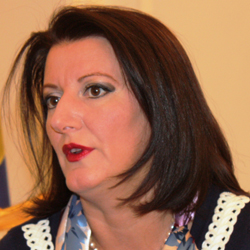Interview With Kosovar President: ‘We Will Never Negotiate For Our Sovereignty’


Serbia and Kosovo have committed to resume European Union-sponsored talks that were suspended during Serbia’s recent election season. RFE/RL correspondent Arbana Vidishiqi spoke with Kosovar President Atifete Jahjaga about Pristina’s approach to the discussions.
RFE/RL: A political dialogue between Kosovo and Serbia has been announced. Does Kosovo have any preconditions for entering this dialogue and which issues can be discussed?
Atifete Jahjaga: The Republic of Kosovo is a sovereign and independent state. It has a full territorial integrity. It establishes normal relations with other countries as an equal and international entity. It will be this way in all relations with the Republic of Serbia, too.
As two neighboring countries, we have to normalize relations between our countries by establishing diplomatic relations. In relations between two countries, there is normally a dialogue on all issues of interest for both of the countries, expressed by signing of bilateral international agreements. By political dialogue, I underline the will and readiness expressed by the two countries to solve and reach an agreement on any issue.
RFE/RL: Does Pristina have a plan or a strategy on these talks with Belgrade?
Jahjaga: No. It doesn’t need to have a plan, nor a strategy. As you know, for the Republic of Kosovo, its strategy was defined by the Independence Act. The concrete steps would be institutional measures, including the program of the Kosovar government, the work by the Kosovar Parliament. To put it simply, [it would be] the full implementation of Kosovo’s Constitution and its laws.
RFE/RL: The most difficult issue to talk about would be the northern part of Kosovo. There are many options for it, including a special status or autonomy. How ready is Pristina to enter these talks with Belgrade on this particular issue, keeping in mind the requests for a special status for this part of the country?
Jahjaga: Our state, the Republic of Kosovo, will never negotiate with anyone over any part of our territory, for our sovereignty. There will be an internal dialogue with our citizens and their legitimate representatives. There will be a dialogue with Serb citizens living in three municipalities in the northern part of our territory, as there is a dialogue with our other citizens, living in other municipalities, including those inhabited by a Serb majority. But there is no external dialogue and there will be no such dialogue for internal issues of the Republic of Kosovo.
RFE/RL: Can a solution be imposed on the north, since neither of the sides is ready to give up their stances?
Jahjaga: No. There is no one to impose [this] since each solution has to be found willingly and should be implemented. In any case, it is necessary to include the preparedness of Kosovo’s institutions and the free will of the citizens living under certain conditions. These two processes are inseparable.
RFE/RL: Kosovo and Serbia aspire to EU membership, but it seems like, for now, they’re both obstructing each other on this path by not normalizing their relations. Is the EU a place to achieve such a normalization?
Jahjaga: No. I think that we should solve all the issues before we enter the EU. We should demonstrate that we’re willing to fulfill all the standards and norms before we become EU members. For the Republic of Kosovo, as well as for the Republic of Serbia, the path toward EU integration would be much easier if both countries help each other and if they set a good example by building neighborly relations.
RFE/RL: We’re approaching the day when the supervised independence of Kosovo will end. What are the remaining challenges?
Jahjaga: These are normal challenges facing any free and independent country — an equality with all other states in the international arena, a country which is at peace and stable and which is ready to take up its obligations and responsibilities.
